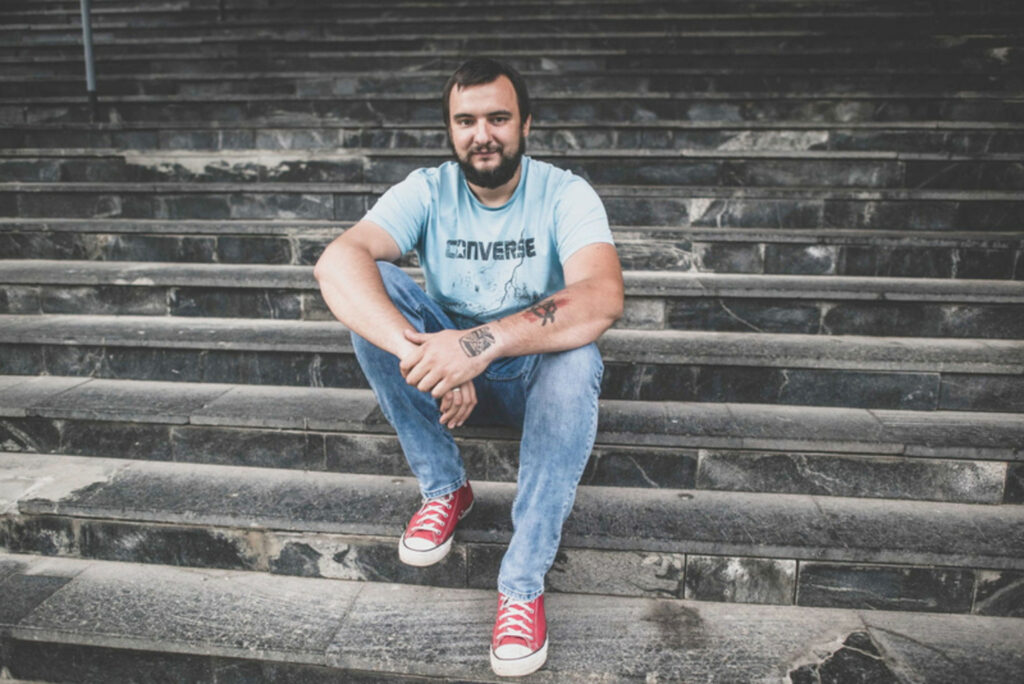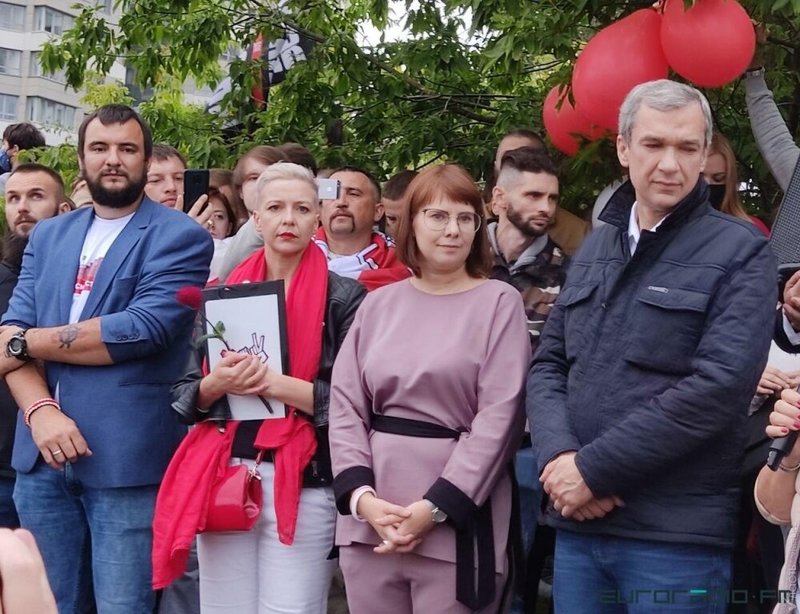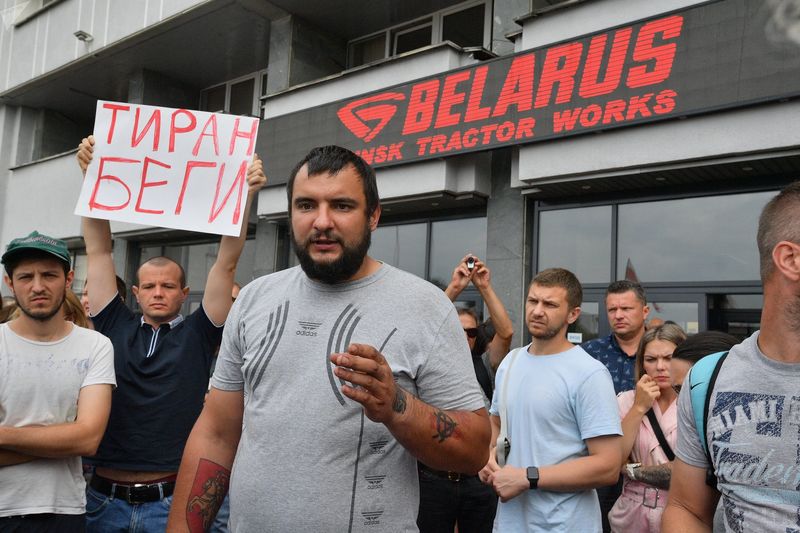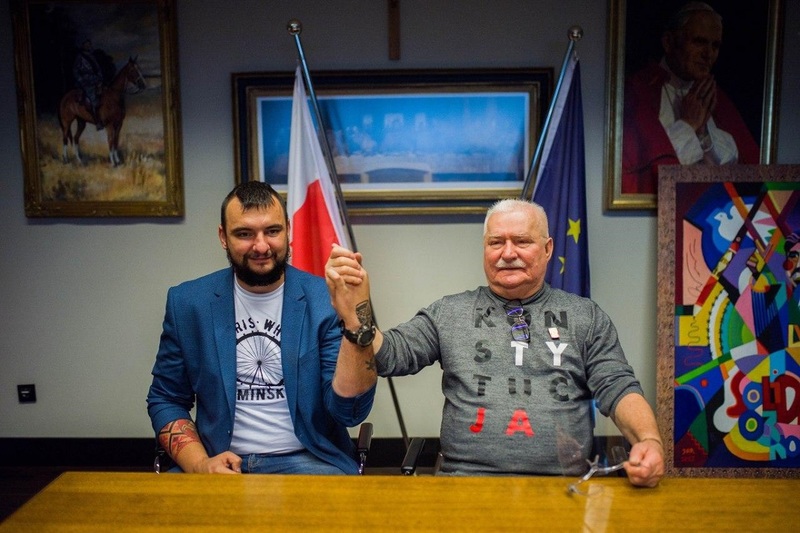Siarhei Dyleuski tells what would happen if strikes in Belarus stop
3 November 2020 | Maryia Mialekhina, KYKY

Source: KYKY
The most famous worker in Belarus, the head of the strike committee of the Minsk Tractor Plant (MTZ) and a member of the Coordination Council, Siarhei Dyleuski, is now in Warsaw – he urgently had to leave the country after receiving death threats. Siarhei told Kyky how events were developing since August, what he was doing now, and about his meeting with the first president of Poland, Lech Wałęsa. The story below is what he shared with us.
Part 1. Election campaign
I am 31 years old, so the first presidential elections I could vote in took place in 2010. But then, as in 2020, my vote was stolen and the elections were falsified. Then there were riots at the central square of the city, followed by a crackdown. I received three administrative reports under Article 23.34 and served 70 days in total. From that moment, I became apolitical – it seemed that nothing could be changed.
In 2020, the coronavirus hit, the economy was deteriorating and my salary was no longer enough to feed my family. Then there were the detentions of presidential candidates, harsh crackdowns, and violence. And I again became actively involved in the political life of the country. The starting point were the events of 9-11 August 2020.
After the announcement of the preliminary results of the elections, my friends and I went for a walk in the city in the evening – we were in the area of Nemiga and Stela. We managed to break through the cordon of the security forces – we just went to the shields. All our guys are physically strong. Therefore, we did not get to Akrestsina that night. I arrived home in the morning – at five o’clock, and by seven I had to go to work. On 10 August in the evening, I again went to the city, although in the morning I had to go to work again. And I kept to this schedule for three days. Then the access to the internet was resumed, and people were terrified that this could happen on the streets of Minsk. A wave of indignation and anger went through the MTZ factory, and on Thursday, 13 August the factory naturally stopped.
Part 2. Strike
Our factory is quite large – there are even streets and a central square. People began to leave factory shops and gather at the administration building. The director then came out, bleated something, but did not say anything certain. The next day, the factory workers continued to strike, and Prime Minister Raman Halouchanka arrived at the MTZ factory. He wanted to talk to the representatives of the strike committee, but the conversation did not work out. I was ready to talk only in the presence of independent media, but journalists were not allowed. Halouchanka said that he had come to talk with workers, not with the media, and “there is no need to arrange a circus”. At that moment, I could not resist and said everything I thought about the government, that they were liars and deceivers. I knew perfectly well that if the conversation was not recorded, tomorrow on the pro-government media they would tell and show everything in a different light. What is the point of talking if people “change their shoes in-flight”? Therefore, I warned Halouchanka that I would wait for him together with the media and went behind the checkpoint. We waited for about forty minutes, but he never came out. And if the government did not want to go to us, we went to them. On that day, the workers first went out into the city and in a column reached the Government House.
In the following days, other companies also went on strike, and on 18 August, Lukashenka came to meet workers at Minsk Wheeled Tractor Plant (MZKT). His speech was supposed to be broadcast online at other factories, so screens were urgently installed in the central squares. But our guys from MTZ decided to go and meet Lukashenka in person.
Source: TUT.BY
Then a huge number of people gathered at the gates of MZKT: not only workers but also those who were not indifferent and came to support. People chanted: “Go away!” And from the crowd, they shouted: “Fuck you, President!” And also: “Shoot yourself, officer!” Of course, Lukashenka heard all this. And you could see how he was already shaking, poor fellow, behind his platform. I know that one of the guys who was shouting obscenities has fled to Ukraine. Documents are now being prepared to send him to Poland. Another guy who shouted “Shoot yourself, officer” was sentenced to 30 days of administrative arrest. He is already released and continues to be active in Minsk.
This visit to MZKT, I think, was a shock for Lukashenka. After all, it was on the workers that he relied on as a supporting electorate – and they shouted such things to him. And they shouted in his face, although people are carefully selected for such meetings. It was the moment of the collapse of all the good things he had done before. People began to see in Lukashenka only a dictator and a tyrant.
Part 3. Detention
After Lukashenka left, the ideological department of the factory began to pressure the workers: they threatened with layoffs and wolf tickets, as it is called, if you are fired, you won’t be able to get a job at any other factory. But people continued striking, and I received an offer to join the Coordination Council to represent the interests of the workers. I accepted. Of course, my parents were worried and afraid of my arrest, but I explained that if we do nothing today, tomorrow we would live like slaves behind barbed wire in a police state. And they listened to me. Now they support me in everything, I am grateful to them for that.
On 24 August, together with Volha Kavalkova [a representative of Sviatlana Tsikhanouskaya – note by KYKY] we arrived at the MTZ entrance to talk to the factory workers at lunchtime. And before we even had time to say hello to the people, the riot police arrived and Volha and I were detained.

Source: Euroradio via KYKY
In the prisoner transport, they did not beat me much – they hit me lightly with a baton several times. First, they brought us to the Partsizanski Police Department, then to Akrestsina, and the next day they escorted us to Zhodzina. During all this time, neither a lawyer nor my relatives knew my whereabouts. In total, I served a 25-day arrest, after which, probably, I was finally registered as a revolutionary.
Part 4. Threats and layoffs
On 19 September, I returned to work, but I began to strictly follow all the instructions and kept all the regulations. I contacted the management in writing, stating that I refused to perform a shift task because the equipment was defective. And at first, there were just conversations in the ideological department… But then some plain-clothed people met me at the entrance, introduced themselves as KGB officers, and put me in a tinted bus. For two and a half hours they explained to me what they could do to me: which forest and in which trunk they would take me, how they could put me into prison, how they would rape my wife, and so on. You know, accidents and suicides occur in Belarus when people are found hanged in a park. And I realized that this government is not ashamed of any methods, so I sent my family abroad.

Source: KYKY
About a week after this conversation, they “asked” to leave my job, they began to press through my parents. Like, if I don’t leave on my own, my retired mother, who also works at MTZ, would be fired. As a result, I wrote a request “by mutual agreement of the parties,” but after I was dismissed, I launched an even larger-scale work in the strike committee. And everything is fine with my mother – she continues to work, but in January her contract ends. And most likely it will not be extended.
You know, I have never regretted my decision to go on strike and have always openly told the representatives of the so-called authorities what I think of them. I am an ordinary guy who works on thermal tool equipment – nobody has given me any instructions. Therefore, I did the best I could in the revolution. The only thing I regret is that it was necessary to act harder concerning the management and not give in to persuasion to write the request, to declare a strike, and so on – this is a bluff. A strike represents a right that the workers have, paperwork leads nowhere but the bureaucracy. Provided we had done that, we could have settled our claims back in September.
Part 5. Leaving the country
Soon after I was fired, I was warned to leave the country. It was not a threat – good acquaintances said that they were preparing a “case” for me. On the same day, the guys from “Country for Life” took me to the border.
On the Belarusian side, they kept waiting for a long time. The officer on duty phoned some chiefs, but they locked me up and said nothing. Several people guarded the door and looked at me as if I was a terrorist. Then a phone rang, the shift supervisor knapped: “Yes, Sir.” And I was escorted to the Polish border.
In Warsaw, I immediately went to the Belarusian House, and I was offered a rehabilitation program – to go to a sanatorium for two weeks. I refused – it was necessary to find permanent housing, especially since my wife and a child were to arrive soon. There was no financial question – I had some money with me, but it is difficult to rent an apartment without speaking the language and not knowing the city. Volunteers from the Center for Belarusian Solidarity helped me with that. Now I have settled down and continue to be active in the strike committee.
I want to convey to the workers that it is important to get united – everyone deserves a pat on the back. Only in this case, we will win. If 200 people come out, it’s easy to fire them, but if 2,000 do – it is not. Unfortunately, there is still no unity among the factory workers, many are afraid to go on strike because they are not sure that others would do the same.
For 26 years, they banged employees of companies over the head: “You are nobody. If we don’t like something about you, tomorrow we will take another one in your place.”
This fact has left a big mark on their minds: no one wants to stick his or her head out. Many are afraid of layoffs. But if you are a great specialist, you can always go to a private business. They appreciate the staff and will offer a better salary and different conditions. Why is the private business on strike? Because these people think freely – they constantly develop and put a slave out of themselves. Students are on strike because they have not formed a slave mentality yet. And in factories every day they drum into you that you are an empty place, and dog eat dog. But that’s not true!
Hey, guys, look around, look to the right and the left! Excellent people work by your side. And if you don’t get united, they will oppress you one by one, fired and repressed. If you get united, you will become unbeatable. Look at “Grodno Azot” – that’s who you need to learn solidarity from. The guys expressed their opinion, they are united and stand their ground to the end. I admire these people.
Part 6. A meeting with the first president of Poland
In Gdansk, I met with Lech Wałęsa – he was once an ordinary electrician at a shipyard and then became the country’s first president. Thanks to this man, Poland managed to defeat communism and to hold the first democratic elections. He is the smartest person from whom one has a lot to learn – he made an indelible impression on me and gave me some advice. One of them is to convey to workers that there are no puppeteers behind the protests and that workers themselves must fight for their rights. First of all, workers must throw off the slave shackles, for their own sake, and not for the authorities.

Source: KYKY

Source: KYKY
In Poland, the protest movement began with small steps: first, five people went on strike at a shipyard in Gdansk, then ten, twenty, and so on. The flywheel spun slowly. But these events took place in Poland in the 1980s, and now the age of information technology is at the door. And what the Poles managed to achieve in 10 years, Belarus can repeat much faster.
But the regime would do everything possible to intimidate and suppress strikes because they represent a great threat to its existence. The economy and the stability of the current regime depend on the work of large factories. If the workers get united, Lukashenka’s time is out. Though today it is difficult to imagine the scenario of how events will develop. I can only hope that the strikes will take place in the open, but I do not exclude that they will spill over into a partisan movement according to the Italian scenario.